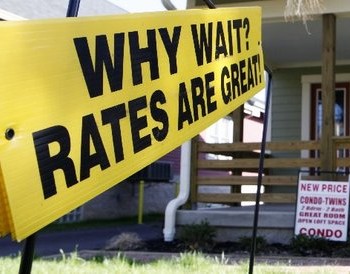 We may be witnessing one of the best refinancing opportunities in history, but there are roadblocks to overcome before you can take advantage of them.
We may be witnessing one of the best refinancing opportunities in history, but there are roadblocks to overcome before you can take advantage of them.
According to the Primary Mortgage Market Survey on the Freddie Mac website, the average 30-year fixed-rate mortgage is now 3.62 percent, while the average 15-year mortgage rate is only 2.89 percent.
Freddie Mac has surveyed lenders across the nation weekly since 1971, and mortgage rates have never been lower. This may truly be a once-in-a-lifetime opportunity to minimize interest expenses on what is one of the most significant investments any American will make — a home.
With rates so low, you would assume many homeowners would be able to take advantage and refinance. Unfortunately, a byproduct of the financial crisis has been an increase in refinancing roadblocks. Developing strategies to overcome these roadblocks may help you seize the current opportunity.
LOW APPRAISAL VALUES
With real estate prices down significantly since the highs of 2006, declining home values have been among the most significant refinancing hurdles for homeowners to overcome since they no longer have enough equity in their home to meet lending requirements. In fact, according to Zillow.com, 31.4 percent of all homes with a mortgage are “underwater,” meaning the owners owe more on a home than it’s worth.
Today, many banks no longer perform a typical appraisal and rely on outside services to estimate the value of a home without ever stepping foot in it. Unfortunately this approach ignores the quality of finishes and other items that could affect the value of a home by as much as 10 to 15 percent. In addition, banks have become more cautious with their appraisal process, and that has also led to lower values. Consider working with your own real estate broker or appraiser to get an assessment of your home’s value, and be prepared to challenge the mortgage company’s appraiser to ensure that you are getting a fair estimate.
Even with a fair appraisal, many homeowners have little or no equity in their home. In addition, few people have excess cash to apply toward lowering their loan balance. If you find yourself in this position, the next step is to determine who holds your mortgage and evaluate the ever-improving loan modification alternatives for which you might qualify.
MODIFICATIONS
If you have tried to modify your mortgage in the past without success, recent enhancements may improve your chances this time around. For homeowners who are current on their mortgage payments but have been unable to refinance due to a decline in the value of their home, the Making Home Affordable Refinance Program (HARP) could help. In fact, recent changes to the program may allow homeowners who owe as much as 125 percent of their home’s current value to refinance. The mortgage, however, must be owned or guaranteed by Freddie Mac or Fannie Mae.
For homeowners whose mortgage is not owned or guaranteed by Freddie Mac or Fannie Mae but who owe more than their home is worth, an FHA Short Refinance may help. If your mortgage is already insured by the Federal Housing Administration, or FHA, you may qualify for a “streamlined” refinance that doesn’t require an appraisal. Visit www.hud.gov for additional information.
There are currently 12 programs through the federal government’s Making Home Affordable initiative. Visit makinghomeaffordable.gov online or call (888) 995-HOPE to learn more.
LOW CREDIT SCORES
In the past, a credit score of 680 or better meant that you would get a shot at some of the most attractive financing options. Today, mortgage companies demand a score of 740 or better. Before you shop for refinancing options, consider pulling your credit report to ensure that all information contained on the report is accurate. While it may seem insignificant, even a 10 to 20 point adjustment in your score could make a difference when it comes to having your application approved. While standards have increased, homeowners with credit scores as low as 620 may qualify for loans through the FHA.
Finally, shop around. Consider beginning the refinancing process by contacting your current lender to determine what options are available, then obtain at least three other rate quotes. Remember, not all lenders view your situation the same, and rates can differ substantially. In fact, shopping around may save as much as 1 percent on the rate you obtain for your loan.
With interest rates at record lows, homeowners could save thousands of dollars over the life of a mortgage. Despite the obstacles that exist, a proactive approach to refinancing can help you take advantage of a rare opportunity.
Since each person’s situation is unique, and we do not offer mortgage services, consult with your adviser.
Kurt J. Rossi, MBA, is a Certified Financial Planner Practitioner. He can be reached for questions at (732) 280-7550 or kurt.rossi@Independentwm.com. LPL Financial Member FINRA/SIPC.









